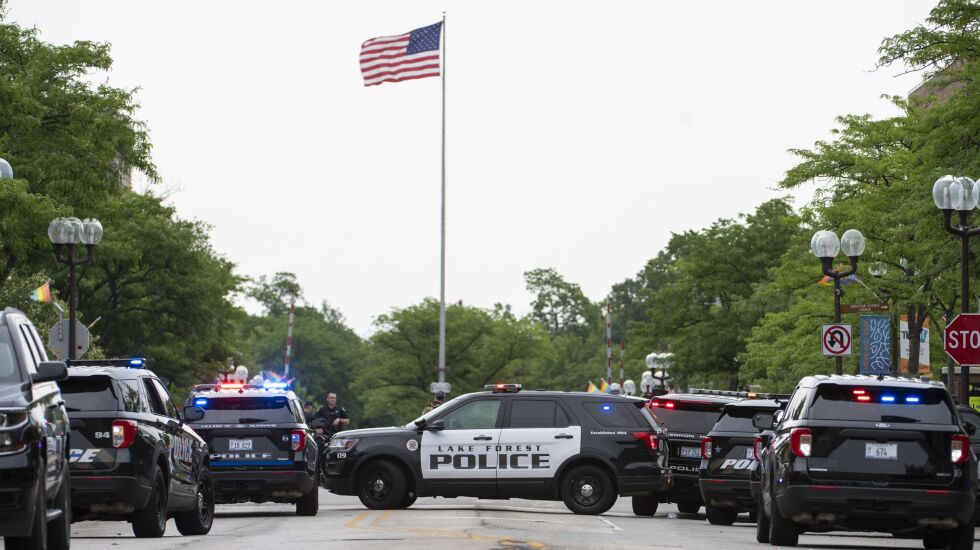
Mayor Lori Lightfoot and U.S. Rep. Robin Kelly, D-Ill., on Tuesday touted passage of the most sweeping federal gun safety legislation in 30 years — without knowing whether any of its provisions would have prevented Monday’s massacre at Highland Park’s Fourth of July parade.
The Bipartisan Safer Communities Act enhances background checks for gun buyers age 18 to 21. It also encourages states to enact “red flag” laws that could allow temporarily confiscating guns from dangerous people.
The sweeping law provides hundreds of millions of dollars for mental health and school safety and imposes stricter penalties on gun trafficking and straw purchases of guns — ”two of the things that plague us most in Chicago,” Lightfoot said.
“You can literally walk across the border and, if you’ve got the money, you can buy military-grade weapons in any quantity that you want. And we see that happening every single day. The result is chaos and heartache in our streets,” the mayor told a news conference at Aunt Martha’s Southeast Chicago Community Health Center, 3528 E. 118th St.
“With this legislation, straw purchasing is now a federal crime. A critically important step. Gun trafficking is now a free-standing offense for the first time in federal law. It’s a crime to dispose of a gun to an individual that you know is prohibited from purchasing one.”
Amid what Lightfoot calls a post-pandemic “explosion” in domestic violence, the legislation also closes what’s became known as the “boyfriend loophole.”
No longer are individuals convicted of domestic violence barred from having guns only if their crimes were committed against spouses or partners with whom they had children. The five-year ban on gun ownership also extends to those with a “continuing serious relationship of a romantic or intimate nature.”
Kelly was asked which, if any, of those safeguards would have stood a chance at preventing Monday’s attack.
Police have arrested 21-year-old Robert Crimo III. They said the gun used was an AR-15-style semiautomatic rifle, legally purchased by Crimo, and that the attacker fired from a rooftop into the crowd of parade spectators, killing 7 people and wounding dozens more.
“I don’t know if there could have been red-flag issues…that could have tagged him,” Kelly said of Crimo. Police did not, however, say exactly where or when the gun was purchased.
“There’s enhanced background checks. I don’t know what his mental state is. So maybe the red flag laws would have helped. I don’t know his whole story, so I’m not sure,” Kelly said.
“And it depends on when he purchased the gun. He could have been 18, 19, 20 or 21. ... So there would have been extra vetting for him to get the gun.”
Kelly bristled at the suggestion that the new law would have made no difference at all.
“People always say what you say. But we know, if you look across the United States, that these laws would have helped save lives. Maybe not in one particular case or another. But, in general, we know that these laws will save lives,” she said.
Lightfoot acknowledged “some have criticized” the hard-fought legislation and “said it’s not enough.”
But, she said: “After 30 years of futility, we’ll take this step forward.”
The Rev. Michael Pfleger, the crusading pastor of St. Sabina Catholic Church, called the bill a “great beginning,” but argued nothing will change until Congress approves “comprehensive universal background checks across this country,” closes the gun show loopholes and cuts off the pipeline of guns flowing freely into Chicago from Indiana.
Rev. Pfleger admonished the “self-righteous, fake righteous senators who are so strong about speaking about right-to-life, so concerned about getting a child born, then the hell with them once they get born.”
He added:
“The doctors down in Texas said they used DNA to identify the children because their faces were blown up. The doctor in Highland Park said: ‘These bodies were literally blown up that were killed.’ Where’s your right-to-life? Where’s your conscience? Where are you saying, ‘We’ve got to protect human life’?”







